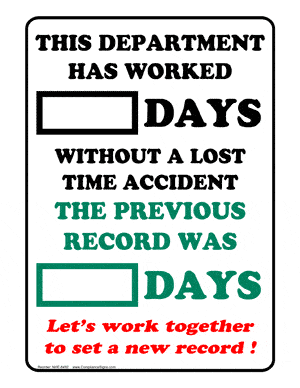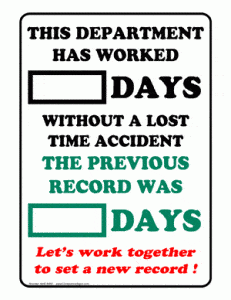
 A sign in the parking lot between CCMS and Farragut Elementary school exclaims, “We have been accident-free for ___ days.” There are no numbers written in the blanks; presumably there have been no accidents during the work that the construction company has been contracted to do on our campus. I said to a Japanese colleague as we passed in front of the sign, ” Look at that! You would NEVER see a sign like that in Japan! ” She nodded, and said to me, “Yeah, in Japan safety is considered so…basic…” You would not be touting safety as an advertisement.
A sign in the parking lot between CCMS and Farragut Elementary school exclaims, “We have been accident-free for ___ days.” There are no numbers written in the blanks; presumably there have been no accidents during the work that the construction company has been contracted to do on our campus. I said to a Japanese colleague as we passed in front of the sign, ” Look at that! You would NEVER see a sign like that in Japan! ” She nodded, and said to me, “Yeah, in Japan safety is considered so…basic…” You would not be touting safety as an advertisement.
Japan is a place of “perfection expected, and heartfelt and immediate apologies if expectations are not met.” As opposed to the more American approach of “apologies in advance for our imperfections.”
In Japan, the police do not carry guns. Instead of patrolling in cars, they usually stay in little so-called “police boxes” or koban” (there’s one in little Tokyo in downtown LA), which are little kiosks in neighborhoods throughout the larger metropolitan areas that make up Japan. I was reminded of the friendly little neighborhood koban, because they are the last place I saw such a tally; they announce in a seemingly binary code-like totals, the number of traffic accidents or fatalities that occur in their precinct each day/week/month.
Safety is the most basic responsibility of a construction company, before costs or craftsmanship. Conversely, a standing police box does not really have jurisdiction over the safety of its drivers in the area, but check out the difference in approach: the police insinuating themselves in the area’s safety numbers there, whereas here, police often cannot be bothered to even stop for traffic accidents, which are considered the purview of insurance companies.
I found the existence of such a sign on our campus chilling. The work being done is improving our campus in many ways, and I have no complaints. What got me started was the symbol of a sign like that, setting out the possibility, even, that an accident could ever occur in such a situation. I maintain that safety comes first, and no work should be done without the expectation, the guarantee, of 100% safety. In our jobs as teachers, safety certainly comes first. As was sadly driven home in the Sandy Hook shootings, state standards are inconsequential when teachers had to fight off, and lose the battle, to an armed assailant.
Natural disasters notwithstanding, Japan is known for its zero tolerance policy for errors on car assembly lines, which dashed the stereotypical American “lemon” concept. In the making of a samurai sword, or a piece of pottery, striving for perfection is legendary. Entire films, both dramatic and documentary, have been produced about the Japanese approach to perfection in food, from Juzo Itami’s 1985 Tampopo, to the 2011 Jiro Dreams of Sushi.
The Japanese have brought their dedication to zero-defect craftsmanship and celebration of the arts to the rest of the world, and we love it. This is what brought many students to learn Japanese with me at Culver City Adult School over the years. When I ask people what they love about Japanese culture, they cite things like: the simplicity of haiku, they speak of anime most frequently these days, food is always high on the list, and martial arts, like karate, is often mentioned. A student of mine said “cherry blossoms.” The gorgeous cherry blossoms in our capital, Washington DC, are indeed a gift from Japan.
But enough of extolling Japan’s virtues; back to the dichotomy between Japan and America on the subject of apologies. I am reminded of a Japanese friend’s road incident years ago. My Japanese colleague got rear-ended on the 405. Both parties got out of the car to exchange information. As is the Japanese way, Yasushi stepped out of the car, business card in hand, and apologized. Oops. We Americans are taught that you never use the word “sorry” at the scene of an accident, lest the show of remorse be considered an admission of guilt. We are well versed in the fact that traffic accidents almost always have a percentage of fault on both sides. The one and only time an accident is ruled as 100% liability is in the case of a rear-ending. Despite the fact that it was the guy in the back’s fault, he dogged my friend for over a year, threatening to sue. All because of Yasushi’s Japanese show of humility.
The Japanese are not as litigious a society as we are here. An immediate and heartfelt apology solves a lot of acrimony in Japan. In my days in the travel business, the many details that go into travel arrangements sometimes went astray. These days, we make our own arrangements via the internet, and bear the brunt of our own mistakes. In the day, however, travel agencies insinuated themselves in between, and, for the commission received when things went well, fielded customer service complaints when they did not.
When I was working for one American company that dealt with Japan, I was sent to attend to some irate Japanese customers. They’d paid in advance for reservations to an exclusive golf course. When the executives showed up, the course had no record of the reservations. The middle manager who had made the reservations had lost face, and somebody had to fall on their sword to make up for it. Three men arrived at our customer service desk. One was well-dressed, silent. One was younger, with deferent posture. The middle guy was talkative, loud, unlike the stereotypical Japanese businessman; he was angry. I’d prepared a full refund in advance, the reservation had not been consummated; we clearly owed the money back. But I knew that the full refund was not the point. Rather, we had to be shown as taking responsibility, in order to demonstrate that the loud-talking middle level executive had not made an error. I ran out and practically fell to the ground in successive bows saying, “moushiwake gozaimasen!” which is the highest form of apology. It worked. The king-like customers left without further incident, or request for hardship compensation.
The Japanese are sometimes said to be more apologetic than Americans, and maybe this is so, given the cultural differences I have discussed. All of this brought me to have a think about the business adage “do first, apologize later.” When you have confidence, and believe in what you are doing, you sometimes are willing enough to take a risk, and move forward on an experimental basis even, to feel out whether an idea is good or not. I don’t think I would have accomplished half of the major lifetime achievements I can claim without having adopted this perspective a long time ago. And yes, I have been admonished, I’ve been ‘buked, the tops of my hands are red from the slaps.
What I recall from working in Japan for ten years was this: it is NOT generally a workplace of risk-takers who would dare to move forward without permission. The Japanese workplace actually might be considered the antithesis of that. Japanese business, and government, for that matter, is mired in consensus building. The government has taken heat both during the 1995 Kobe earthquake, and the recent Fukushima disasters, for lack of immediate action under crisis.
The Japanese do have, however, a willingness to live in the world of “gray;” of not spelling out every detail in black and white. In that sense, I recall it having been easy to get stuff done in Japan, that is, until a decision had to be made, and a consensus reached. At that point, the process of gaining 100% approval took an enormous amount of time. The flip side, however, was that when a decision was finally made, everybody would fall in line. The deed, whatever it might have been, could get done to perfection, and with team spirit.
I spent twenty years in the private sector of the business world, and ten in the public sector, in education. I have found the education “business” more similar to the Japanese business world in some ways. In education, with often with what is a “union shop” of workers, management strives for consensus, in order to keep everyone happy. We are fond of taking votes about this, and surveys about that. This is more like Japan, where people didn’t used to get fired or “laid off” as readily as U.S. workers.
But school years are lessons in the fresh starts of autumn and abrupt closures of summer. With such a short window, you just have to take a leap, a risk even, and make strong decisions about trying something new. Since you can’t please all the people all the time, you’ll see stuff coming down the pike that does not, cannot, always obtain that 100% alignment of Japan. You learn that life goes on as a work-in-progress that can always be tweaked the following year.
So don’t be afraid to “just do it,” go ahead, man up, take a little risk! As long as you a confident enough, and willing to accept responsibility, you can always apologize afterwards!


Be the first to comment